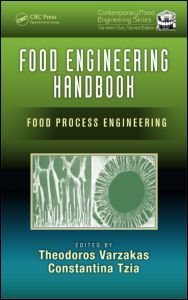Food Engineering Handbook Food Process Engineering Contemporary Food Engineering Series
Coordonnateurs : Varzakas Theodoros, Tzia Constantina

Food Engineering Handbook: Food Process Engineering addresses the basic and applied principles of food engineeringmethods used in food processing operations around the world. Combining theory with a practical, hands-on approach, this book examines the thermophysical properties and modeling of selectedprocesses such as chilling, freezing, and dehydration. A complement to Food Engineering Handbook: Food Engineering Fundamentals, this text:
- Discusses size reduction, mixing, emulsion, and encapsulation
- Provides case studies of solid?liquid and supercritical fluid extraction
- Explores fermentation, enzymes, fluidized-bed drying, and more
Presenting cutting-edge information on new and emerging food engineering processes, Food Engineering Handbook: Food Process Engineering is an essential reference on the modeling, quality, safety, and technologies associated with food processing operations today.
Membrane Separation. Size Reduction. Centrifugation–Filtration. Crystallization. Mixing Emulsions. Solid–Liquid Extraction. Supercritical Fluid Extraction. Chilling and Freezing. Drying of Foods. Fluidized Bed, Spouted Bed, and In-Store Drying of Grain. Fermentation and Enzymes. Fluid and Species Transfer in Food Biopolymers. Encapsulation of Food Ingredients: Agents and Techniques. Multiphysics Modeling of Innovative and Traditional Food Processing Technologies. New/Innovative Technologies.
Theodoros Varzakas received a bachelor’s degree in microbiology and biochemistry, MBA in food, and Ph.D in food biotechnology from Reading University, UK in 1992 and 1998, respectively. He has been a postdoctoral researcher at Reading University, worked in large pharmaceutical and multinational food companies in Greece, and possesses at least 14 years of experience in the public sector. Since 2005, he has served as an assistant and associate professor in the Department of Food Technology at the Technological Educational Institute of Peloponnese, Greece (Higher Institute of Kalamata, Greece), specializing in issues of food technology, food processing, food quality, and safety.
Constantina Tzia received a diploma in chemical engineering and a Ph.D in food engineering from the National Technical University of Athens, Greece in 1977 and 1987, respectively. His current research interests include quality and safety (HACCP) of foods, sensory evaluation, fats and oil, dairy and bakery technology, and utilization of food by-products. Professor Tzia’s work has been widely published and presented, appearing in prestigious publications such as the Journal of Food Science, LWT - Food Science and Technology, Innovative Food Science and Emerging Technologies, Food and Bioprocess Technology, and Journal of the American Oil Chemists' Society.
Date de parution : 11-2014
15.6x23.4 cm
Thème de Food Engineering Handbook :
Mots-clés :
Moisture Content; Uidized Bed; whey; Te Ch; protein; Drying Rate; mass; Mass Transfer; transfer; Ta Ge; nanofiltration; Ge Ta; membranes; ISD; spray; Uidized Bed Dryer; drying; Thin Layer Drying; concentration; FLUIDIZED Bed; polarization; Mono-and Diglycerides; Spouted Bed; Encapsulating Agent; Pressure Hold Time; Food Emulsions; SBD; Fluidized Bed Dryers; Lter Cake; Initial Freezing Point; DPCD; EHDD; Non-thermal Technologies; Electric Eld Strength; SFE Process



